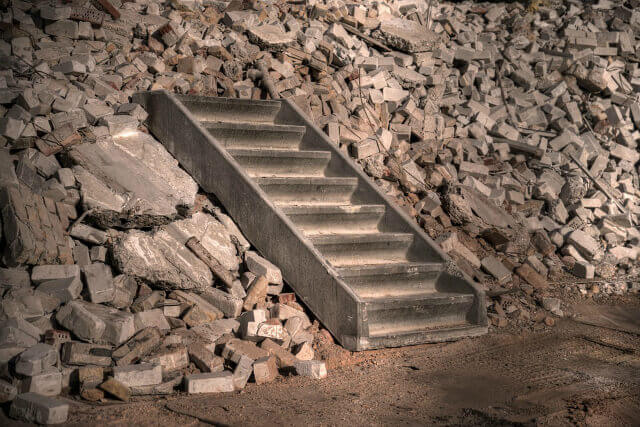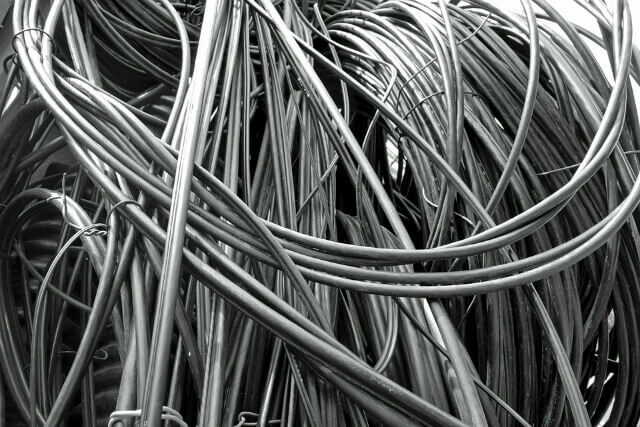How to Handle Construction Waste on the Site

Builders waste is one of the heaviest waste streams produced on the territory of Europe. This waste consists of all kinds of construction materials such as: concrete, gypsum, bricks, plastic, glass, wood and others, many of which could be recycled. In an era when energy savings are becoming more and more important, construction waste is starting to get recognised as a source that could be recovered. Therefore builders waste management is getting more and more regulated by different laws and regulations.
Giving the amount of construction waste we produce and the high percentage of actually recyclable items in it, on top of the value of those materials, builders rubbish is really pointing the attention of authorities towards itself.
Definition of Building Waste

Building waste, also known as construction waste or demolition waste. They are all the same but in some cases a byproduct of different activities.
Definition of Builders Waste: Discarded construction materials that are a byproduct of building, construction or demolition activities. The materials are either not fitted for use or not needed after the fulfillment of the process. (demolition waste, construction waste, CDW)
Recycling Construction Waste

Although in theory most of the rubbish left behind on a construction site is usable and could be recycled, in many cases that is not being done! But why? Why should you leave a bulky pile of trash that has the potential to serve a better purpose just lay in plain sight?
The problem comes from the dangers that are well hidden inside that same pile.
There are many sharp and pointy pieces, that combined with general contamination of the rubbish could be dangerous to anyone trying to scavenge it. Sharp pieces of glass, pointy rusted nails, sharp broken ceramic tiles and so on and so on. All of those can be the reason for severe cut and stab wounds that could get infected thanks to all the dirt on top of them. On top of that keep in mind that there are still isolations out there that are made with asbestos.

Sadly that is not the only reason. Construction site wastes occasionally have substances marked as hazardous laying inside. That type of waste should be contained in a separate place or container, but that is often not the case. This way the whole rubbish pile is now contaminated and recycling it is becoming an even harder task. And of course, more expensive. Those materials are not dissolving, and if they are left in landfills are sure to stay they for a long period of time and are definitely going to harm the environment and wildlife that has contact with them.
In order to classify the different types CDW, the UK government had given them different codes.
Here are some of the materials that you can most often found in construction rubbish:
| Insulation | |
| Insulation containing asbestos | 17-06-01* |
| Other insulation materials | 17-06-04 |
| Bricks, Tiles, and Concrete | |
| Bricks | 17-01-02 |
| Tiles and ceramics | 07-01-03 |
| Concrete | 17-05-01 |
| Wood and Glass | |
| Wood - untreated | 17-02-01 |
| Glass - uncontaminated | 17-02-02 |
| Treated wood, glass, plastic | 17-02-04* |
| Metals | |
| Copper, bronze, and brass | 17-04-01 |
| Lead | 17-04-03 |
| Iron and steel | 17-04-05 |
| Cables containing oil, coal tar, and other hazardous substances | 17-04-10* |
| Other cables | 17-04-11 |
| Soil | |
| Soil and stones | 17-05-04 |
| Soil and stones containing hazardous substances | 17-05-03* |
| Cement and Paint | |
| Un-used or un-set cement | 17-09-03* |
| Paint containing organic solvents or other hazardous substances | 08-01-11* |
The codes that end with a star (* - asterisk) are being classified as hazardous. For a full list of construction waste and their codes see here.
Limiting impact of Building Waste
This process can’t start after the waste is already generated. Meaning that even if we sort the general rubbish and divide it into reusable and not reusable materials and of course those that could be recycled, what is left is still going to be a more than enough. In order to limit even that, we have to take measures way back in the very planning, construction process and even packaging of building materials.
Some waste could be limited by designing the structure in such a way that it needs fewer materials to be created, like carefully planning the electric system, the water feeding system, and others, in order to use exactly the amount of pipes and cables we need and not wasting any on useless design mistakes.
By optimizing the very building process, we can cut a substantial volume of waste. For instance, even by using metal shuttering that can later be reused on another site, we cut down wood waste. Or by carefully over watching the builders work in order to limit their mistakes and therefore cut down the pile of rubbish in the end run.
As far as it goes to packaging, not going in with excessive packaging of materials is leaving us with less waste in general. And that would be a plastic waste in most cases, which is classified as hazardous! This can be eliminated back when designing and manufacturing building materials.
Waste management as Part of the Construction Plan

In order to notably limit the byproduct of our renovation, building or demolition, we have carefully plan each of our steps and always have the end result in mind. The accomplishment of the project should not be the last point of the plan. What happens next?! We should consider our actions after the project is done. This implies for all building projects. Not only on a local level but nationally. Huge enterprises have an even bigger amount of resource that they can use to fulfill this task. However, as conscious citizens, we have to do our best to limit our waste even if the projects is our new kitchen, or demolishing the shed in the backyard in order to construct our BBQ area.
You Are Not Alone In This
And as always, when it comes to waste management and rubbish removal in London, you can trust Tom’s Junk Collectors professionals to handle the heavy burden of any rubbish removal. We have a team fully capable of executing big builders waste jobs. They are aware of the hidden dangers and are well equipped with technical solutions to ease their job! Of course, this is not the only kind of rubbish we can help you with. We take care of old electric appliances and domestic rubbish collection with the same swiftness and professionalism.
